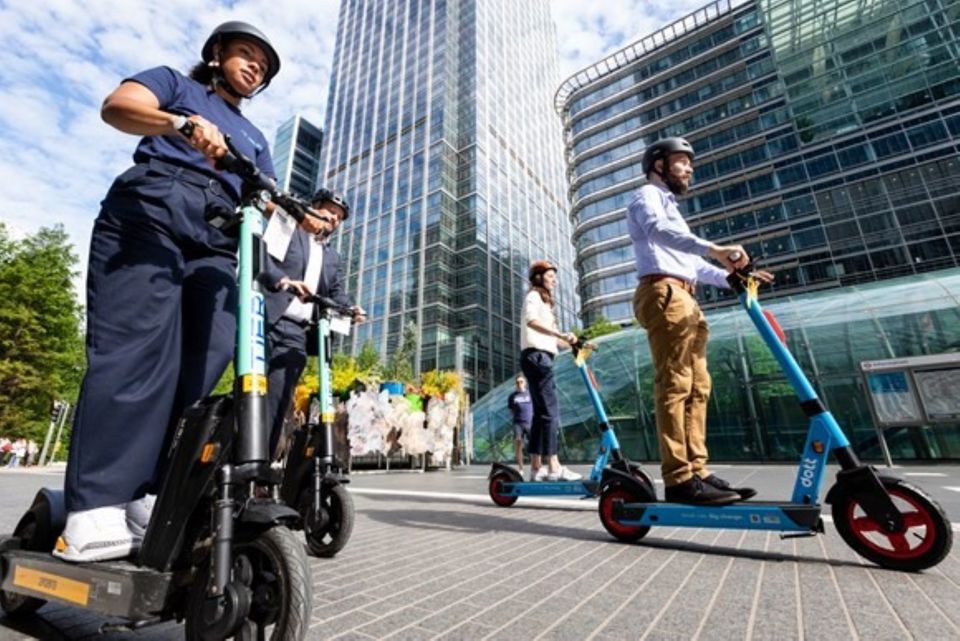The Government should “urgently” legalise e-scooters and accelerate the move to greener transport.
That’s the message from a coalition of councils, transport groups, environmental campaigners and e-scooter scheme operators led by the national charity for shared transport, Collaborative Mobility UK (CoMoUK).
In an open letter to transport secretary Louise Haigh and her ministers, they say a new legal status is the only way to resolve the problems caused by “entirely unregulated” privately-owned e-scooters being ridden on public roads.
The letter also argues that the move would provide the highly successful shared e-scooter trials in England with a long-term future, help the UK meet its net zero and air quality targets, improve public health and unlock investment.
Any legislation will take time to come into effect, so the letter also calls for the expansion of existing shared e-scooter trials in the meantime, as well as the creation of new ones where local authorities and operators agree they are needed.
The intervention comes after the recent King’s Speech did not contain any proposed legislation in this area, despite Haigh’s promise to “move fast and fix things”.
Richard Dilks, chief executive of CoMoUK, said: “The new transport secretary, Louise Haigh, has told her department that she wants to ‘move fast and fix things’. We say: excellent, let’s start by expanding shared e-scooter trials and, ultimately, legalising e-scooters.
“By clearing up the ongoing uncertainty around their status on the UK’s roads, ministers can give this cheap, flexible and green mode of transport a long-term future.
“Legalisation would improve safety standards and clear away the negative perceptions of e-scooters that have arisen largely due to the total lack of regulation.
“Given how popular shared e-scooters have proven in trial areas in England, it could also make a significant contribution to helping the UK meet its climate change targets.
“We know we have to attract people away from the use of private cars, and e-scooters are one mode of transport that can help to do this.”
The previous Conservative government committed to legalise e-scooters in 2022, but since then progress has stalled.
A series of trials of shared e-scooters in England have been repeatedly extended.
Figures gathered by CoMoUK show that the trials have been highly successful, with millions of users taking nearly 48 million trips since they began in July 2020.
However, safety concerns have been raised about their use, with accident data published by the Department for Transport (DfT) in September, last year, showing a rise in fatalities.
There were 1,402 collisions involving e-scooters in 2022, compared to 1,352 the previous year.
There were also 12 deaths in collisions involving e-scooters, 11 of whom were e-scooter riders, compared to 10 in 2021.
DfT says its best estimate, after adjusting for changes in reporting by police, is that there were 440 seriously injured and 1,040 slightly injured in collisions involving e-scooters, this compares to 418 and 1,006 respectively in 2021.
CoMoUK research, however, suggests that serious safety incidents are rare, with only one accident for every 500,000 trips.
The open letter says e-scooters could be legalised through the creation of a new “low powered zero emission vehicle class” which could also apply to other forms of transport.
It says giving e-scooters legal status is “the only solution to the situation with private e-scooters, which are entirely unregulated and unlawful to ride on the public highway, but can be legally bought and are very often illegally ridden”.
It is currently illegal to ride e-scooters on public roads in the UK, but many unregulated vehicles are still in circulation, creating a negative perception of the vehicles.
The legalisation of e-scooters would create a standard set of technical specifications and safety standards that all such vehicles would have to comply with.
The letter acknowledges that new legislation will take some time to work its way through parliament, calling on the government to expand shared e-scooter trials in the meantime.
It calls for the Government to allow the trials to expand in response to local demand, with suppliers able to increase their fleet sizes and let them cover wider areas.
Ministers should also allow new trial schemes to begin if there is support among local councils and operators, it adds.























martinwinlow - 31/07/2024 14:59
If our new government were to only successfully sort out this glaring anomaly in the vehicle registration system, their election would be worthwhile... If they could do the same for cannabis (at least) as well, it would be even better.